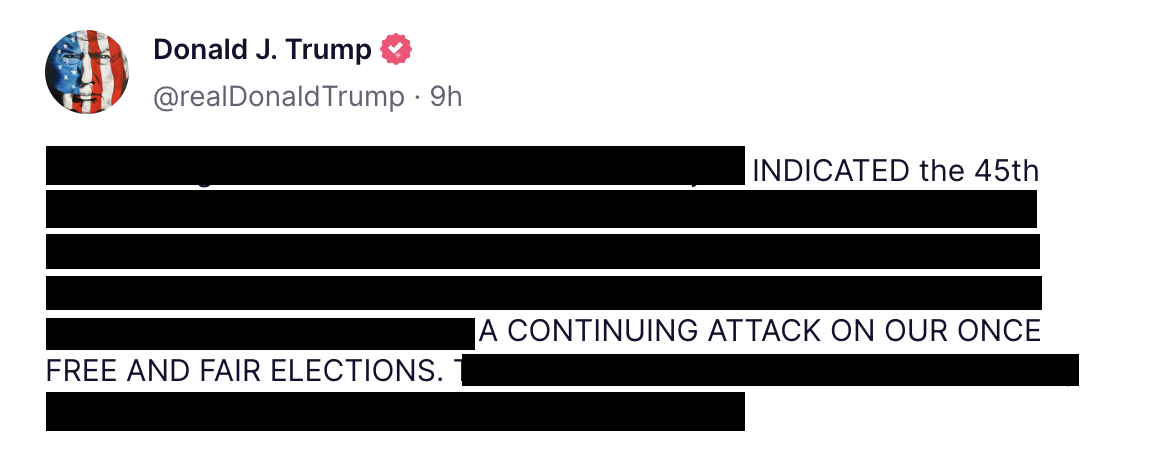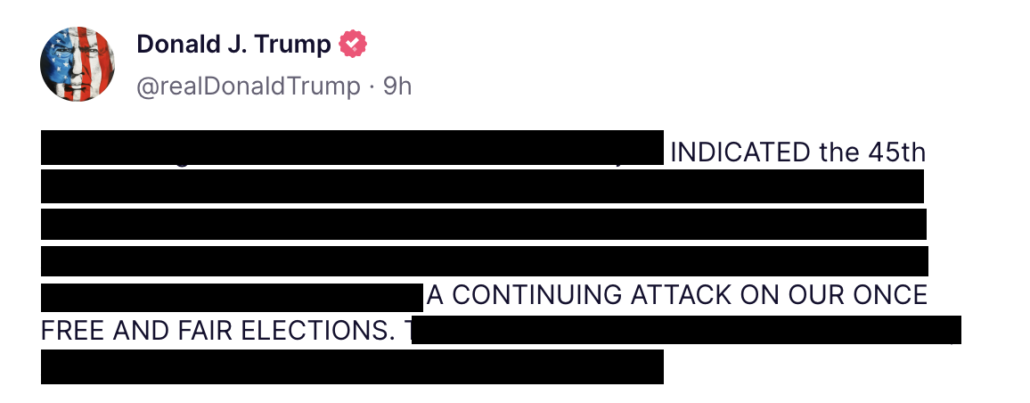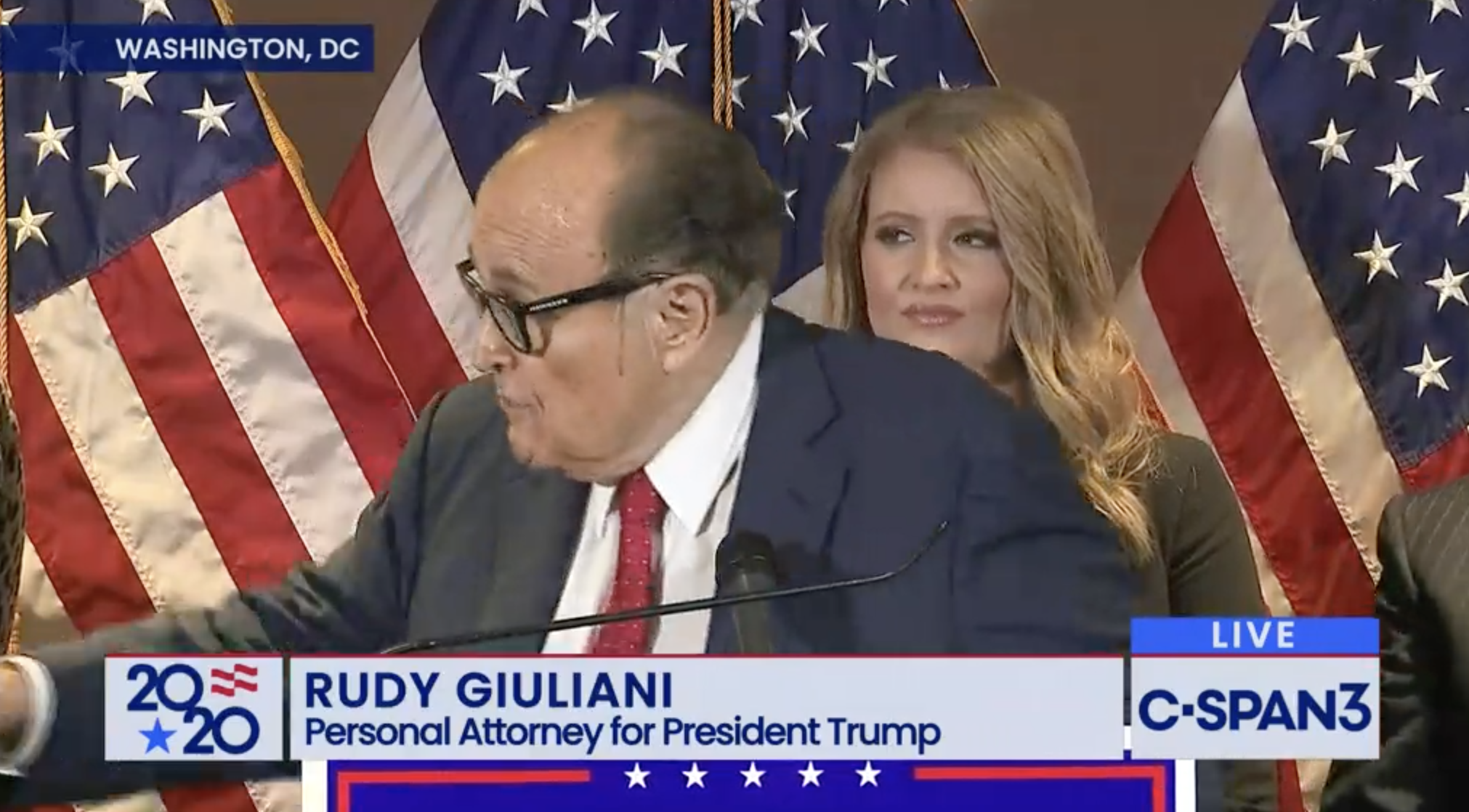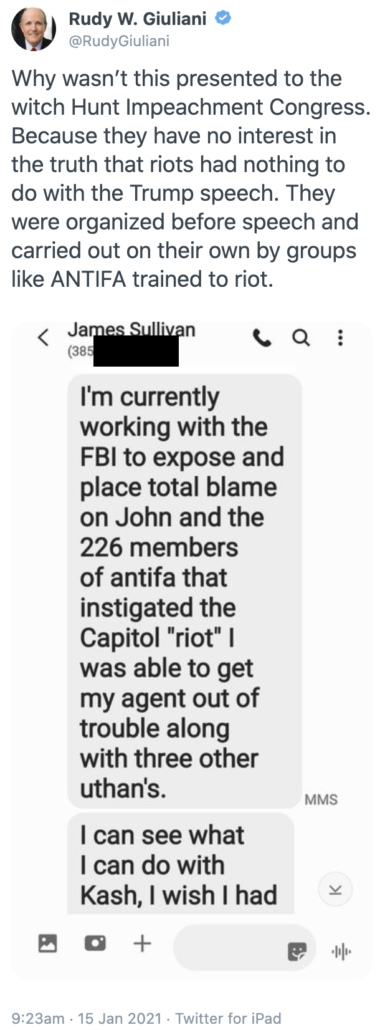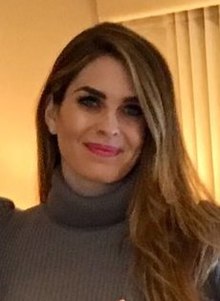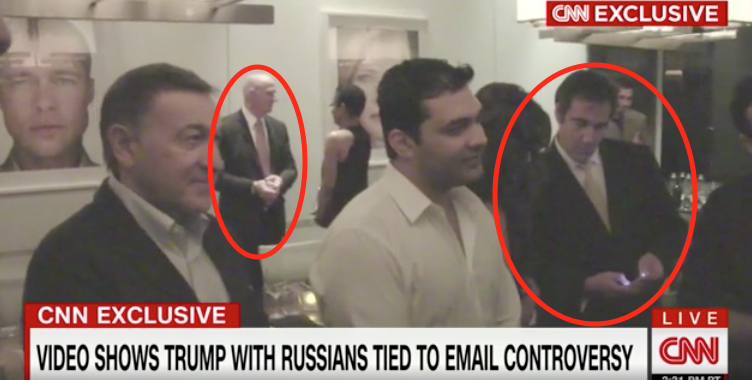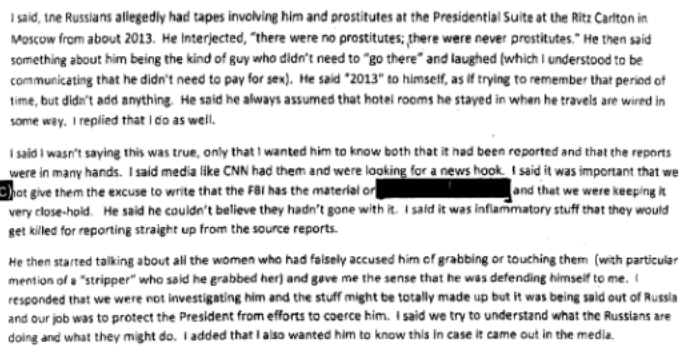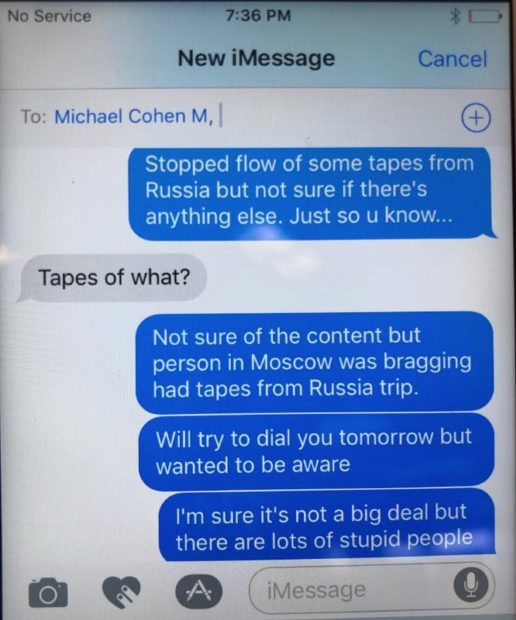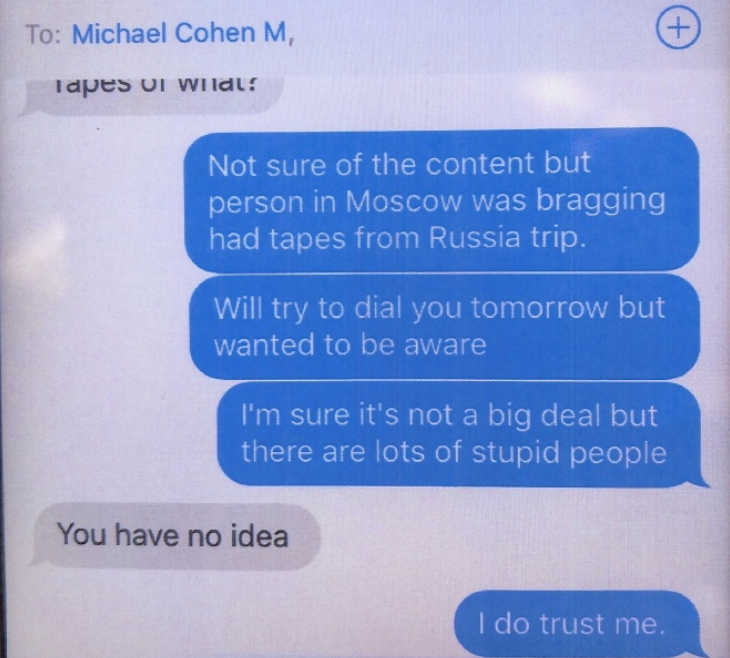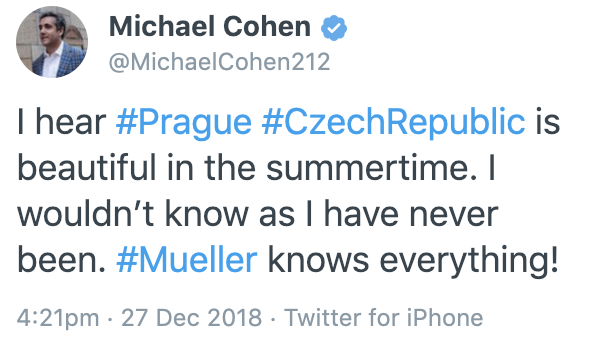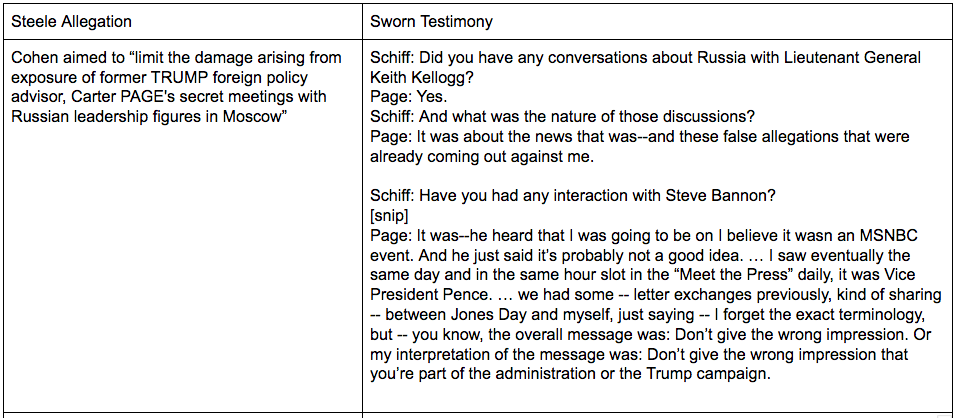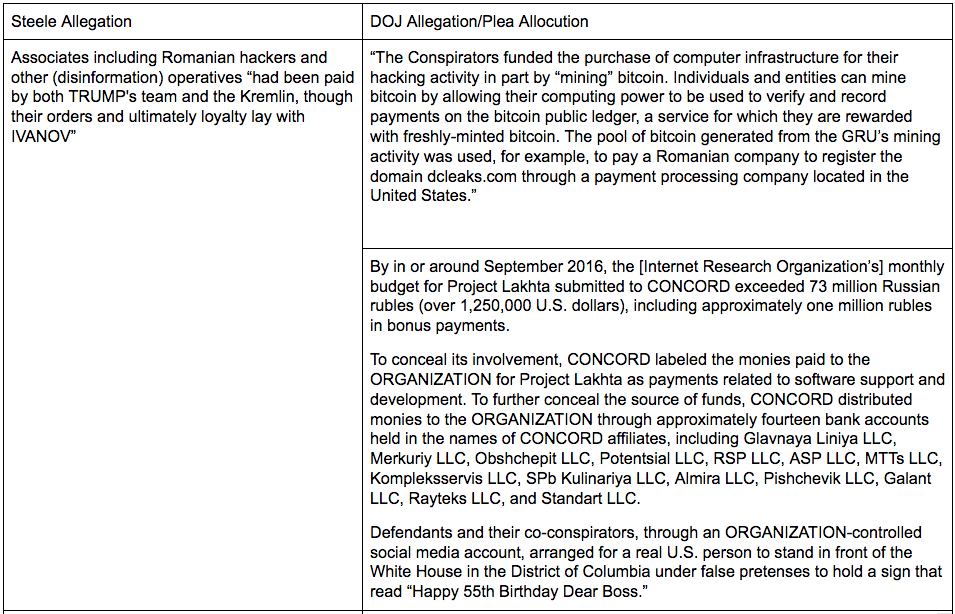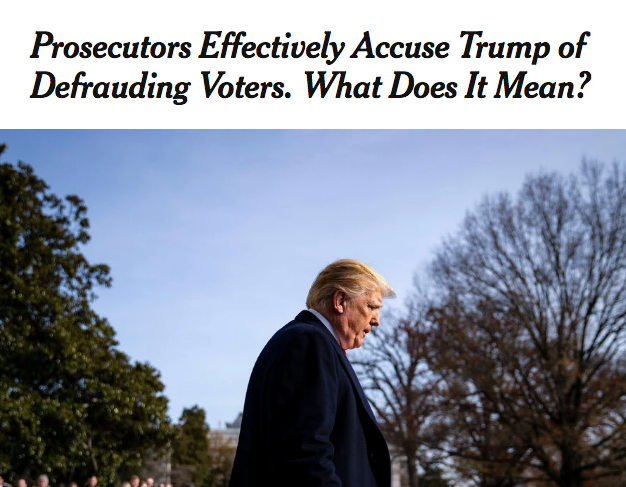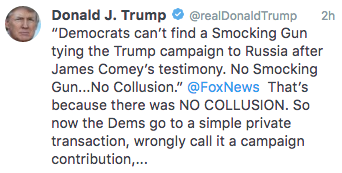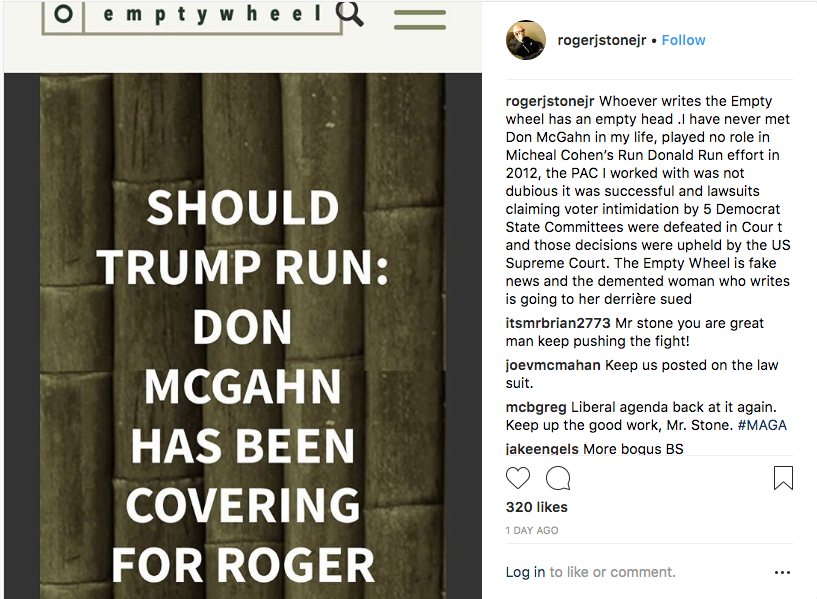Trump’s People Have Attempted to Cover Up That He Cheated to Cover Up Cheating in 2016 at Least Six Times
Among the things Trump said in his tweet yesterday complaining that he had been “indicated” is that his criminal prosecution was “a continuing attack on our once free and fair elections.”
Thanks to the former President for reminding us what the charges against him, in part, are about: That he cheated to win.
Whether it would have made a difference or not, Donald Trump believed it sufficiently important to lie to American voters about fucking two women– both Karen McDougal and Stormy Daniels — that both were paid in the last months of his 2016 campaign to prevent voters from finding out.
Paying his former sex partners to hide from voters that he cheated on Melania is not, itself, illegal.
Having corporations pay sex workers for the purpose of benefitting a political campaign is. The company that owned the National Enquirer paid for the first payment, to McDougal; Trump Organization, by reimbursing the payment that Michael Cohen made, eventually paid for the second payment, to Daniels.
The charges brought against Trump in NY reportedly relate, at least in part, to the second payment — to the treatment of the reimbursement to Cohen as a legal retainer rather than a reimbursement for a political donation. That is, the cheapskate billionaire, who could have legally paid off the women himself, allegedly covered up his cover-up.
Trump’s eponymous corporate persons have already been found guilty of serving as personal slush funds. In 2019, he admitted the Trump Foundation had engaged in self-dealing. And last year, a jury convicted Trump Organization of compensating employees via untaxed benefits rather than salary.
The new charges against Trump aren’t so much unprecedented, as they simply charge Trump’s biological person with the same crimes for which his corporate persons have already been convicted.
But there’s more history here, too. On multiple occasions, agents of Donald Trump reportedly engaged in further attempts to cover-up this cover-up.
Trump Organization withheld multiple documents from investigators. Most known documents that were withheld — such as the email showing Cohen had a substantive conversation with a Dmitri Peskov aide during the election — pertain to Russia, but it’s certainly possible they withheld others.
In 2018, in the days after SDNY seized phones that included recordings of conversations about the hush payments, Trump is suspected of floating a pardon to Cohen to keep him quiet, about this and about the impossibly lucrative Trump Tower deal both had lied to hide from voters in 2016.
In an email that day to Cohen, [Robert] Costello wrote that he had spoken with Giuliani.1026 Costello told Cohen the conversation was “Very Very Positive[.] You are ‘loved’. . . they are in our corner. . . . Sleep well tonight[], you have friends in high places.”1027
Cohen said that following these messages he believed he had the support of the White House if he continued to toe the party line, and he determined to stay on message and be part of the team.1028 At the time, Cohen’s understood that his legal fees were still being paid by the Trump Organization, which he said was important to him.1029 Cohen believed he needed the power of the President to take care of him, so he needed to defend the President and stay on message.1030
Cohen also recalled speaking with the President’s personal counsel about pardons after the searches of his home and office had occurred, at a time when the media had reported that pardon discussions were occurring at the White House.1031 Cohen told the President’s personal counsel he had been a loyal lawyer and servant, and he said that after the searches he was in an uncomfortable position and wanted to know what was in it for him.1032 According to Cohen, the President’s personal counsel responded that Cohen should stay on message, that the investigation was a witch hunt, and that everything would be fine.1033
Note that the payments for Cohen’s legal fees — which stopped after he pled guilty — are another expense that Trump Organization may not have accounted for properly.
Later in 2018, during the period where he was feigning cooperation with Mueller’s prosecutors but really just stalling past the midterm elections, Paul Manafort attempted to lie about some aspect of a different investigation
Manafort gave different versions of events surrounding an incident in the summer 2016 that was potentially relevant to the investigation: one version that was more incriminating was given prior to signing the plea agreement (on September 13, 2018), and another that was more benign was made after on October 5, 2018, after his plea. When confronted with the inconsistency by the government and his own counsel, Manafort largely retracted the second version.
A footnote in that discussion cites the Cohen plea, suggesting the 2016 conversations that Manafort lied to prosecutors in an attempt to spin pertained to these hush payments.
83 See United States v. Cohen, 18-cr-602 (S.D.N.Y. 2018); Information, United States v. Cohen, 18-cr602 (S.D.N.Y Aug. 21, 2018) (Doc. 2).
Unlike Cohen, of course, Manafort did get a pardon.
In the months after Cohen’s plea, Main DOJ attempted to interfere in the Cohen investigation repeatedly, as laid out in Geoffrey Berman’s book. They did so first on Rod Rosenstein’s orders, by demanding the SDNY rewrite Cohen’s statement of offense to hide the degree to which Trump ordered the hush payments (Rosenstein’s deputy, Ed O’Callaghan tried to eliminate all reference to Individual-1).
We then sent a copy to Rod Rosenstein, informing him that a plea was imminent. The next day, Khuzami, who was overseeing the case, received a call from O’Callaghan, Rosenstein’s principal deputy.
O’Callaghan was aggressive.
Why the length, he wanted to know. He argued that now that Cohen is pleading guilty we don’t need all this description.
[Robert] Khuzami responded, What exactly are you concerned about? O’Callaghan proceeded to identify specific allegations that he wanted removed, almost all referencing Individual-1.
It quickly became apparent to Khuzami that, contrary to what O’Callaghan professed, it wasn’t the overall length or detail of the document that concerned him; it was any mention of Individual-1.
[snip]
The team was tasked with the rewrite and stayed up most of the night. The revised information, now twenty-one pages, kept all of the charges but removed certain allegations, including allegations that Individual-1 acted “in concert with” and “coordinated with” Cohen on the illegal campaign contributions. The information now alleged that Cohen acted in concert and coordinated with “one or more members of the campaign.” But in the end, everything that truly needed to be in the information was still there.
Then, after Bill Barr came in, he amazingly tried to order SDNY to dismiss the charges against Cohen entirely, the functional equivalent of what he tried with Mike Flynn, undoing a successful criminal prosecution after the fact.
When Barr took over in February 2019, he not only tried to kill the ongoing investigations but—incredibly—suggested that Cohen’s conviction on campaign finance charges be reversed.
Barr summoned Rob Khuzami in late February to challenge the basis of Cohen’s plea as well as the reasoning behind pursuing similar campaign finance charges against other individuals. Khuzami was told to cease all investigative work on the campaign finance allegations until the Office of Legal Counsel, an important part of Main Justice, determined there was a legal basis for the campaign finance charges to which Cohen pleaded guilty—and until Barr determined there was a sufficient federal interest in pursuing charges against others.
Barr had Steven Engel write up an OLC opinion about the charges (which is likely one of the reasons SDNY didn’t charge Trump).
About six weeks later, Khuzami returned to DC for another meeting about Cohen. He was accompanied by Audrey Strauss, Russ Capone, and Edward “Ted” Diskant, Capone’s co-chief. Barr was in the room, along with Steven Engel, the head of the Office of Legal Counsel, and others from Main Justice. A fifteen-page memo, drafted by Engel’s office, had been provided to our team the day before, which they were still analyzing. I learned later that it was an intense meeting.
When SDNY refused to dismiss the case against Cohen, Barr tried to transfer the case to EDNY, under Richard Donoghue, so he could kill it.
About a week after our office tussled with Barr and Engel, Barr attempted to do just that. Word was passed to me from one of Barr’s deputies that he wanted Richard Donoghue, the US Attorney for the Eastern District of New York (who would later transfer to Main Justice to work under Barr), to take over supervision of anything I was recused from.
At the same time that Barr was trying to cover up that Trump cheated to win in 2016, Republicans on the FEC were joining in the cover-up. After FEC’s General Counsel recommended acting on several complaints about the payments, Republican Commissioners Sean Cooksey and Trey Trainor refused to do so because, they said, Michael Cohen had already been prosecuted for it and, thanks to Trump’s own actions, there was a backlog of other complaints.
Before the Commission could consider the Office of General Counsel’s (“OGC”) recommendations in these matters, Mr. Cohen pleaded guilty to an eight-count criminal information,2 and in connection thereto admitted, among other things, to making an excessive contribution in violation of the Act by making the Clifford payment from his personal funds. 3 The plea hearing transcript includes a step by step review of how U.S. District Judge William Pauley verified the plea, confirming that a federal judge was sufficiently satisfied with the circumstances surrounding the plea deal and the responses given by Cohen at the hearing, including the explanations given by Cohen, count by count, during his allocution.4 Ultimately Mr. Cohen was sentenced to three years in prison and ordered to pay $1.39 million in restitution, $500,000 in forfeiture, and $100,000 in fines for two campaign finance violations (including the payment at issue in these matters) and other charges. In sum, the public record is complete with respect to the conduct at issue in these complaints, and Mr. Cohen has been punished by the government of the United States for the conduct at issue in these matters.
Thus, we concluded that pursuing these matters further was not the best use of agency resources.5 The Commission regularly dismisses matters where other government agencies have already adequately enforced and vindicated the Commission’s interests.6 Furthermore, by the time OGC’s recommendations came before us, the Commission was facing an extensive enforcement docket backlog resulting from a prolonged lack of a quorum, 7 and these matters were already statute-of-limitations imperiled.
This was one of 22 credible campaign finance allegations against Trump that Republicans refused to consider, nothing less than a partisan effort to make the leader of their party immune from all campaign finance rules.
There’s a lot of shite being written about how the indictment of a former President — for actions that stem from cheating to win — will test democracy.
But Trump’s serial cover-ups of his own actions in this and other matters already threaten democracy.
Trump is right: This is about free and fair elections. This is, like most of his allegedly criminal behavior, about his refusal to contest elections fairly. It’s about his corruption of the entire Republican Party, from top to bottom. And it’s about one of at least six times that Trump and his agents have tried to cover up that he cheated to win in 2016.

